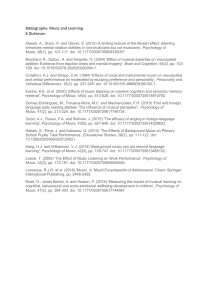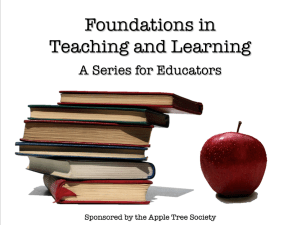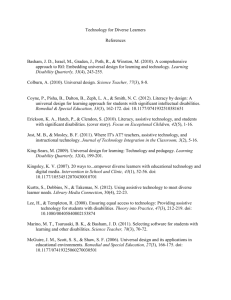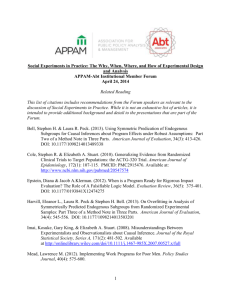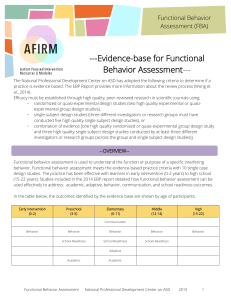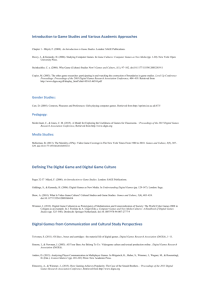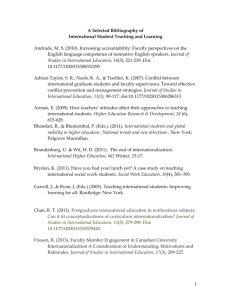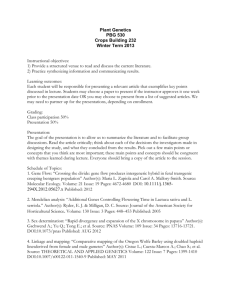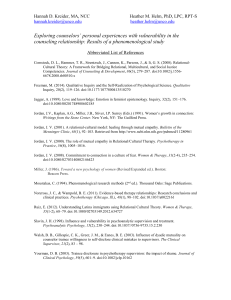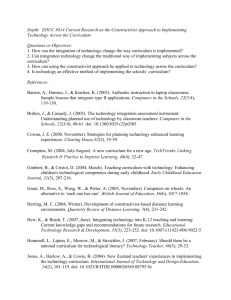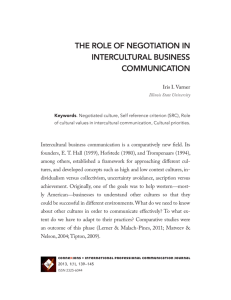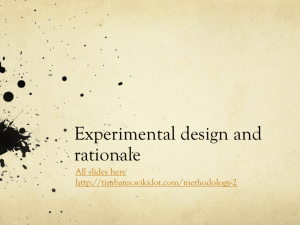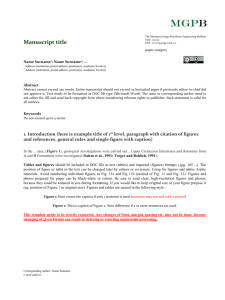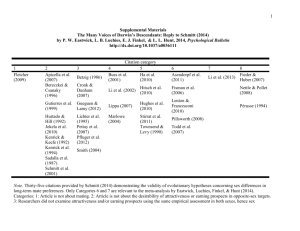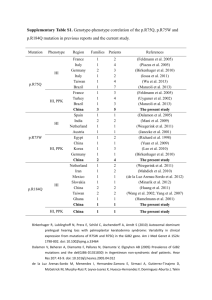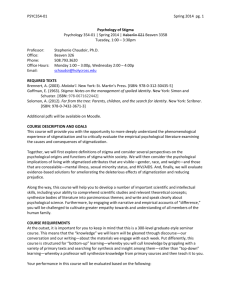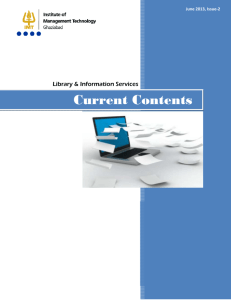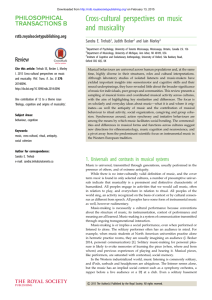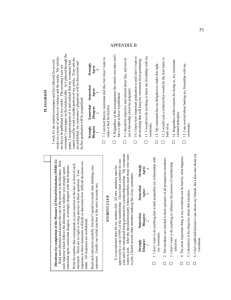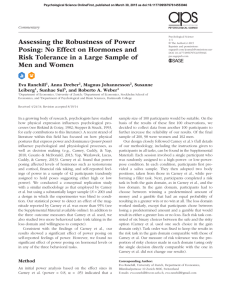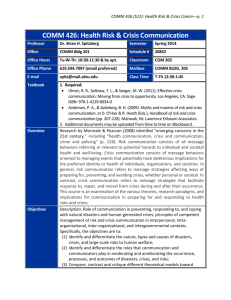Music Makes You Smarter - Berks County Music Boosters
advertisement
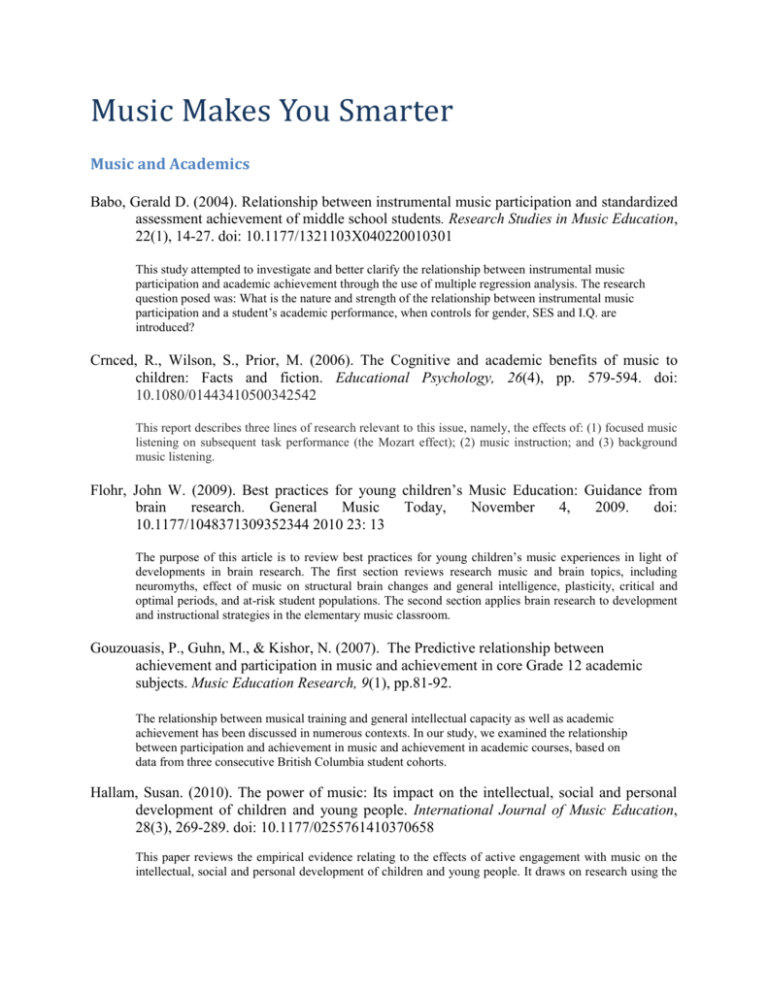
Music Makes You Smarter Music and Academics Babo, Gerald D. (2004). Relationship between instrumental music participation and standardized assessment achievement of middle school students. Research Studies in Music Education, 22(1), 14-27. doi: 10.1177/1321103X040220010301 This study attempted to investigate and better clarify the relationship between instrumental music participation and academic achievement through the use of multiple regression analysis. The research question posed was: What is the nature and strength of the relationship between instrumental music participation and a student’s academic performance, when controls for gender, SES and I.Q. are introduced? Crnced, R., Wilson, S., Prior, M. (2006). The Cognitive and academic benefits of music to children: Facts and fiction. Educational Psychology, 26(4), pp. 579-594. doi: 10.1080/01443410500342542 This report describes three lines of research relevant to this issue, namely, the effects of: (1) focused music listening on subsequent task performance (the Mozart effect); (2) music instruction; and (3) background music listening. Flohr, John W. (2009). Best practices for young children’s Music Education: Guidance from brain research. General Music Today, November 4, 2009. doi: 10.1177/1048371309352344 2010 23: 13 The purpose of this article is to review best practices for young children’s music experiences in light of developments in brain research. The first section reviews research music and brain topics, including neuromyths, effect of music on structural brain changes and general intelligence, plasticity, critical and optimal periods, and at-risk student populations. The second section applies brain research to development and instructional strategies in the elementary music classroom. Gouzouasis, P., Guhn, M., & Kishor, N. (2007). The Predictive relationship between achievement and participation in music and achievement in core Grade 12 academic subjects. Music Education Research, 9(1), pp.81-92. The relationship between musical training and general intellectual capacity as well as academic achievement has been discussed in numerous contexts. In our study, we examined the relationship between participation and achievement in music and achievement in academic courses, based on data from three consecutive British Columbia student cohorts. Hallam, Susan. (2010). The power of music: Its impact on the intellectual, social and personal development of children and young people. International Journal of Music Education, 28(3), 269-289. doi: 10.1177/0255761410370658 This paper reviews the empirical evidence relating to the effects of active engagement with music on the intellectual, social and personal development of children and young people. It draws on research using the most advanced technologies to study the brain, in addition to quantitative and qualitative psychological and educational studies. Helmrich, Barbara H. (2010). Window of opportunity? Adolescence, music, and algebra. Journal of Adolescent Research, 25(4), 557-577. doi: 10.1177/0743558410366594 Findings from a sample of 6,026 adolescents showed that students enrolled in formal instrumental or choral music instruction during middle school outperformed those who experienced neither of those modes of musical instruction. Hodges, Donald A. (2009). Brains and music, whales and apes, hearing and learning… and more. Update: Applications of Research in Music Education, 27(62). doi: 10.1177/8755123308330046 This article is about whalesongs, hearing, musical brains, and a number of other topics explored over the past 35 years. Previous research is reviewed briefly, and more attention is given to recent efforts with an emphasis on collaborative research conducted with many wonderful colleagues. First is a brief account of the Institute for Music Research at the University of Texas at San Antonio, followed by more details on current projects at the Music Research Institute (MRi) at the University of North Carolina at Greensboro. Research at the MRi is divided into six topics: BioMusic, Music-Related Hearing Loss, Music Education, Music Performance, Ethnomusicology and Ecocriticism, and Neuromusical Research. The second half of the article is devoted to neuromusical research. Morrison, Steven J. (1994). Music students and academic growth. Music Educators Journal, 81(2), pp33. ISSN: 0027-4321 Focuses on the relationship between music and academic achievement. Performance of music students in academics and student leadership; Study of the social and academic life of the American tenth-grader by the National Center for Educational Statistics; Measurement of music students' academic performance. Schellenberg, E. Glenn. (2004). Music lessons enhance IQ. Psychological Science, 15(8), 511514. doi: 10.1111/j.0956-7976.2004.00711.x The present report is the first to test this hypothesis directly with random assignment of a large sample of children (N5144) to two different types of music lessons (keyboard or voice) or to control groups that received drama lessons or no lessons. IQ was measured before and after the lessons. Compared with children in the control groups, children in the music groups exhibited greater increases in full-scale IQ. Sousa, David A. (2006). How the arts develop the young brain. School Administrator, 63(11), 26. Retrieved from http://www.aasa.org/schooladministratorarticle.aspx?id=7378 Neuroscience research is revealing the impressive impact of arts instruction on students' cognitive, social and emotional development Southgate, D. & Roscigno, V. (2009). The Impact of music on childhood and adolescent achievements. Social Science Quarterly, 90(1). The study examines the association between music involvement and academic achievement in both childhood and adolescence using three measures of music participation: in school, outside of school, and parental involvement in the form of concert attendance. Standley, Jayne M. Does music instruction help children learn to read? Evidence of a metaanaylsis. Update: Applications of Research in Music Education, 27(17). doi: 10.1177/8755123308322270 This meta-analysis of 30 studies using a variety of music interventions to affect reading skills resulted in a moderately strong, significant, overall effect size of d = .32. When music activities incorporate specific reading skills matched to the needs of identified children (d = .44) or contingent music is used to reinforce reading behavior (d = .66), benefits are large.
